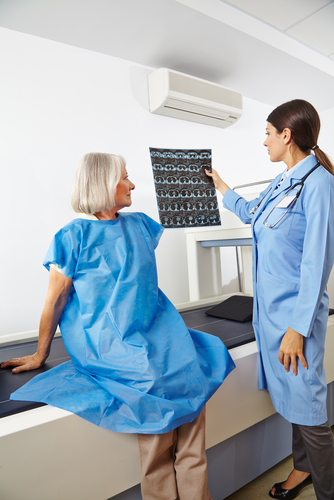
Female provider performing a bone density exam on a female patient.
Bone Densitometry
What is a bone density test?
A bone density test is used to measure bone mineral content and density. It is used mainly to diagnose osteoporosis. The DXA Scan available at Marshall Browning Hospital is considered the “gold standard” or most accurate test.
This measurement tells the healthcare provider whether there is decreased bone mass. This is a condition in which bones are more brittle and prone to break or fracture easily. Most men and women with osteoporosis don’t know they have it until a fracture occurs.
Fortunately, osteoporosis is detectable and treatable and testing is safe and non-invasive The Horizon DXA system at Marshall Browning Hospital enables dimensions in care, including greater insights into biomechanical strength, visualization of calcification in the abdominal aorta that can indicate heart disease, lumbar spine and proximal femur studies, bone mineral density (BMD) measurements of the entire skeleton, atypical femur fracture assessment, and many other clinical applications.
Standard x-rays may show weakened bones. But at the point when bone weakness can be seen on standard x-rays, it may be too far advanced to treat. Bone densitometry testing can find decreasing bone density and strength at a much earlier stage when treatment can be beneficial.
Am I at risk?
You’re at higher risk for osteoporosis if you are:
a post-menopausal woman
a man age 50 or older
recently broke a bone
have a family history
smoke or drink heavily
take steroids or thyroid medication
have a low calcium intake
Why might I need a bone density test?
A bone density test may be used to:
Confirm a diagnosis of osteoporosis if you have already had a bone fracture
Predict your chances of fracturing a bone in the future
Determine your rate of bone loss
See if treatment is working
A physician’s order is required for the DXA scan. For more information, talk to your doctor or call 618-542-1015.
